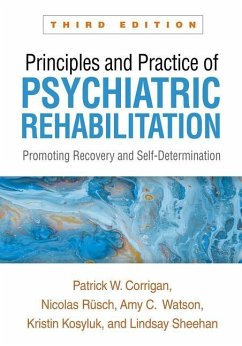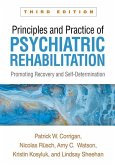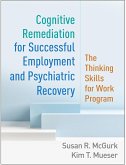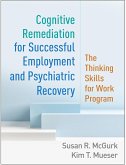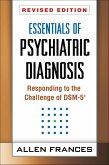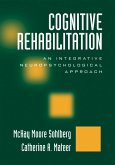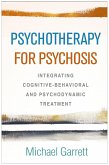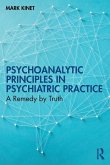Patrick W. Corrigan (United State Illinois Institute of Technology, Nicolas Rusch, Amy C. Watson
Principles and Practice of Psychiatric Rehabilitation, Third Edition
Promoting Recovery and Self-Determination
Patrick W. Corrigan (United State Illinois Institute of Technology, Nicolas Rusch, Amy C. Watson
Principles and Practice of Psychiatric Rehabilitation, Third Edition
Promoting Recovery and Self-Determination
- Gebundenes Buch
- Merkliste
- Auf die Merkliste
- Bewerten Bewerten
- Teilen
- Produkt teilen
- Produkterinnerung
- Produkterinnerung
The leading text and go-to practitioner resource on psychiatric rehabilitation is now in a thoroughly revised third edition, bringing readers up to date on current ideas, findings, and evidence-based best practices.
Andere Kunden interessierten sich auch für
![Principles and Practice of Psychiatric Rehabilitation, Third Edition Principles and Practice of Psychiatric Rehabilitation, Third Edition]() Patrick W. Corrigan (United State Illinois Institute of TechnologyPrinciples and Practice of Psychiatric Rehabilitation, Third Edition78,99 €
Patrick W. Corrigan (United State Illinois Institute of TechnologyPrinciples and Practice of Psychiatric Rehabilitation, Third Edition78,99 €![Cognitive Remediation for Successful Employment and Psychiatric Recovery Cognitive Remediation for Successful Employment and Psychiatric Recovery]() Susan R. McGurkCognitive Remediation for Successful Employment and Psychiatric Recovery60,99 €
Susan R. McGurkCognitive Remediation for Successful Employment and Psychiatric Recovery60,99 €![Cognitive Remediation for Successful Employment and Psychiatric Recovery Cognitive Remediation for Successful Employment and Psychiatric Recovery]() Susan R McGurkCognitive Remediation for Successful Employment and Psychiatric Recovery90,99 €
Susan R McGurkCognitive Remediation for Successful Employment and Psychiatric Recovery90,99 €![Essentials of Psychiatric Diagnosis, Revised Edition Essentials of Psychiatric Diagnosis, Revised Edition]() Allen FrancesEssentials of Psychiatric Diagnosis, Revised Edition52,99 €
Allen FrancesEssentials of Psychiatric Diagnosis, Revised Edition52,99 €![Cognitive Rehabilitation, Second Edition Cognitive Rehabilitation, Second Edition]() McKay Moore Sohlberg (United States University of Oregon)Cognitive Rehabilitation, Second Edition130,99 €
McKay Moore Sohlberg (United States University of Oregon)Cognitive Rehabilitation, Second Edition130,99 €![Psychotherapy for Psychosis Psychotherapy for Psychosis]() Michael Garrett (United States SUNY Downstate Medical Center)Psychotherapy for Psychosis65,99 €
Michael Garrett (United States SUNY Downstate Medical Center)Psychotherapy for Psychosis65,99 €![Psychoanalytic Principles in Psychiatric Practice Psychoanalytic Principles in Psychiatric Practice]() Mark KinetPsychoanalytic Principles in Psychiatric Practice34,99 €
Mark KinetPsychoanalytic Principles in Psychiatric Practice34,99 €-
-
-
The leading text and go-to practitioner resource on psychiatric rehabilitation is now in a thoroughly revised third edition, bringing readers up to date on current ideas, findings, and evidence-based best practices.
Hinweis: Dieser Artikel kann nur an eine deutsche Lieferadresse ausgeliefert werden.
Hinweis: Dieser Artikel kann nur an eine deutsche Lieferadresse ausgeliefert werden.
Produktdetails
- Produktdetails
- Verlag: Guilford Publications
- 3 ed
- Seitenzahl: 404
- Erscheinungstermin: 3. Mai 2024
- Englisch
- Abmessung: 263mm x 187mm x 31mm
- Gewicht: 980g
- ISBN-13: 9781462553716
- ISBN-10: 1462553710
- Artikelnr.: 68585180
- Herstellerkennzeichnung
- Libri GmbH
- Europaallee 1
- 36244 Bad Hersfeld
- gpsr@libri.de
- Verlag: Guilford Publications
- 3 ed
- Seitenzahl: 404
- Erscheinungstermin: 3. Mai 2024
- Englisch
- Abmessung: 263mm x 187mm x 31mm
- Gewicht: 980g
- ISBN-13: 9781462553716
- ISBN-10: 1462553710
- Artikelnr.: 68585180
- Herstellerkennzeichnung
- Libri GmbH
- Europaallee 1
- 36244 Bad Hersfeld
- gpsr@libri.de
Patrick W. Corrigan, PsyD, is Distinguished Professor of Psychology at the Illinois Institute of Technology. Previously, he was Professor of Psychiatry and Executive Director of the Center for Psychiatric Rehabilitation at the University of Chicago. Dr. Corrigan has spent most of his career providing and evaluating services for people with psychiatric disabilities. He has served as principal investigator of the National Consortium on Stigma and Empowerment and led the team that developed the Honest, Open, Proud program. In addition to the impact of stigma on psychiatric disabilities and rehabilitation, his research interests center on the role of social determinants of health such as ethnicity, gender identity, poverty, and criminal justice involvement. The author of more than 450 journal articles and 20 books, Dr. Corrigan is editor of the journal Stigma and Health. Nicolas Rüsch, MD, is Professor of Public Mental Health at Ulm University in Ulm, Germany, and Consultant Psychiatrist in a home treatment team in nearby Günzburg. Dr. Rüsch is one of the editors of the journal Social Psychiatry and Psychiatric Epidemiology. His research interests include mental illness stigma; antistigma interventions, such as the Honest, Open, Proud program; self-concept and disclosure of mental illness; and mental illness and unemployment. Amy C. Watson, PhD, is Professor in the School of Social Work at Wayne State University. She is a past president of CIT International and is currently President of Crisis Response Programs and Training. Dr. Watson's work since the 1990s has centered on people with psychiatric disabilities who have contact with the criminal legal system, with a focus on police encounters and the Crisis Intervention Team (CIT) model. She is currently examining models to reduce/eliminate the role of police in mental health crisis response. Dr. Watson has authored over 100 publications. Earlier in her career, she worked as a probation officer on a team serving clients with serious mental illnesses. Kristin Kosyluk, PhD, is Assistant Professor of Mental Health Law and Policy at the University of South Florida, Faculty Affiliate of the Louis de la Parte Florida Mental Health Institute, and Director of the Stigma Action Research (STAR) Lab. Her research focuses on understanding and addressing the stigma surrounding behavioral health conditions. More recently, Dr. Kosyluk has begun to work in the areas of stigma around HIV and substance use. She is also researching the impact of technology-based antistigma interventions. She is Vice President of the National Alliance on Mental Illness-Hillsborough County and board member at large of the Florida Rehabilitation Association, and serves on the editorial board of Stigma and Health. Lindsay Sheehan, PhD, is Assistant Professor of Psychology and Associate Director of the Center on Health Equity, Education, and Research at the Illinois Institute of Technology. With over 30 peer-reviewed publications, Dr. Sheehan conducts research on the stigma of mental illness, suicide, health equity, and the evaluation of peer services for people with mental illness. She developed the Inspiring Change community-based participatory research (CBPR) curriculum and has extensive experience implementing CBPR programming. She is director of a state-funded program to train certified recovery support specialists and certified peer recovery specialists. Dr. Sheehan also has a decade of experience working in community mental health care, including provision of counseling, case management, residential support, and vocational training services.
Preface
I. Fundamentals to Recovery-Based Rehabilitation
1. Who Are People with Psychiatric Disabilities?
2. Stigma and Mental Illness
3. What Is Psychiatric Rehabilitation?
4. Psychiatric Disability and Equity
II. Strategies That Promote Recovery
5. Assessment
6. Erasing Stigma and Promoting Empowerment
7. Wellness Self-Management and Recovery
8. Care Coordination
9. Medications
10. Housing and Citizenship
11. Employment and Education
12. Family
13. Psychosis and Cognitive Challenges
14. Criminal Justice
15. Physical Health and Wellness
16. Co-Occurring Mental Illness and Substance Use Disorder
17. Peer Supports and Services
References
Index
I. Fundamentals to Recovery-Based Rehabilitation
1. Who Are People with Psychiatric Disabilities?
2. Stigma and Mental Illness
3. What Is Psychiatric Rehabilitation?
4. Psychiatric Disability and Equity
II. Strategies That Promote Recovery
5. Assessment
6. Erasing Stigma and Promoting Empowerment
7. Wellness Self-Management and Recovery
8. Care Coordination
9. Medications
10. Housing and Citizenship
11. Employment and Education
12. Family
13. Psychosis and Cognitive Challenges
14. Criminal Justice
15. Physical Health and Wellness
16. Co-Occurring Mental Illness and Substance Use Disorder
17. Peer Supports and Services
References
Index
Preface
I. Fundamentals to Recovery-Based Rehabilitation
1. Who Are People with Psychiatric Disabilities?
2. Stigma and Mental Illness
3. What Is Psychiatric Rehabilitation?
4. Psychiatric Disability and Equity
II. Strategies That Promote Recovery
5. Assessment
6. Erasing Stigma and Promoting Empowerment
7. Wellness Self-Management and Recovery
8. Care Coordination
9. Medications
10. Housing and Citizenship
11. Employment and Education
12. Family
13. Psychosis and Cognitive Challenges
14. Criminal Justice
15. Physical Health and Wellness
16. Co-Occurring Mental Illness and Substance Use Disorder
17. Peer Supports and Services
References
Index
I. Fundamentals to Recovery-Based Rehabilitation
1. Who Are People with Psychiatric Disabilities?
2. Stigma and Mental Illness
3. What Is Psychiatric Rehabilitation?
4. Psychiatric Disability and Equity
II. Strategies That Promote Recovery
5. Assessment
6. Erasing Stigma and Promoting Empowerment
7. Wellness Self-Management and Recovery
8. Care Coordination
9. Medications
10. Housing and Citizenship
11. Employment and Education
12. Family
13. Psychosis and Cognitive Challenges
14. Criminal Justice
15. Physical Health and Wellness
16. Co-Occurring Mental Illness and Substance Use Disorder
17. Peer Supports and Services
References
Index

